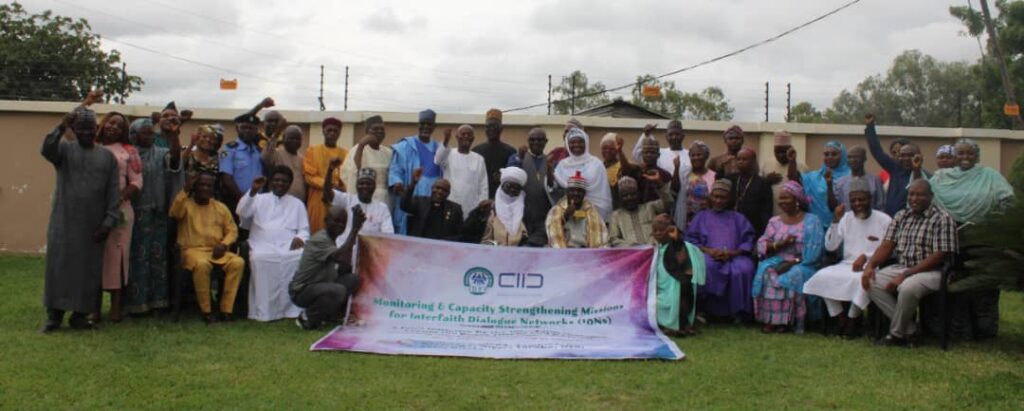From Scholastica Hir, Makurdi
As part of measures to curtail the escalating crisis and killings of innocent citizens in Benue and Taraba states, the Inter-faith Dialogue Forum for Peace (IDFP), Nigeria, has called on both governments, as well as the federal government, to increase their support for mediation and dialogue efforts.
The Co-Chairman, IDFP Nigeria, Rev Abainitus Hamman, made this call in Jalingo, Taraba State, during a Monitoring and Evaluation/Capacity Building Workshop organised to strengthen peacebuilding Interfaith Dialogue Networks (IDNs).
Rev Hamman, who lamented that for too long, land disputes, ethno-religious tensions, and political competition have been exploited to divide the people, said the loss of lives, displacement of families, and destruction of livelihoods are painful reminders of the urgent need for peace, justice, and inclusive dialogue.
He, however, noted that “These challenges are complex, but not insurmountable. We must understand the root causes—poverty, misinformation, historical grievances—and work collectively to address them.”
While calling on governments at all levels to increase their support for peace efforts, the Co-Chair said, “In our journey toward peace, the role of government is indispensable. We need enabling policies, funding for interfaith engagement, support for conflict early warning systems, and protection for communities vulnerable to violence.
“Government must not only respond to conflict but invest in preventing it through education, youth empowerment, inclusive governance, and recognition of the role of religious and traditional leaders in peacebuilding.”
He urged all participants not just to leave with knowledge, but with renewed determination to be agents of peace in their immediate Benue and Taraba communities, saying that peace is not a one-day event, and it is not the task of one group alone.
Also speaking, the Co-Chairman (Muslim), IDFP, Dr Yusuf Arrigasiyyu, said, “We gather at a time of great concern and heartbreak. The continued killings, displacement, and destruction in Benue and Taraba States are deeply troubling to every conscience guided by faith and humanity.
“Men, women, and children are suffering and dying in cycles of violence that serve no purpose other than to divide, destroy, and deepen mistrust among communities.”
According to him, as religious leaders and moral voices in society, both the Qur’an and the Bible call us to be peacemakers, adding that there is a need to speak with one voice to say: No more bloodshed in the name of God. No more hate in the name of faith.
“Our mission as faith leaders is not merely to preach peace, but to build bridges, defuse tensions, and create avenues for healing. We must engage our communities, not just from the pulpit, but in the fields, markets, and schools, to promote understanding and empathy.”
He proposed that Muslim and Christian leaders embark on Interfaith Peace Missions to affected communities in Benue and Taraba, to condemn the violence and offer collective support and also pressure government actors to fulfil their constitutional duty of protecting all citizens without bias.
He also suggested Community Peace Dialogues that bring together traditional rulers, youth leaders, women, and religious figures to identify local solutions and early warning mechanisms, and Joint Sermons and Prayers where mosques and churches across Nigeria dedicate time to preach the message of peace, tolerance, and reconciliation.
The Galadima of Miri, District Head of Jalingo, Lamido Tukur Abba Tukur, applauded IDFP leadership for the workshop and urged them to involve more traditional leaders and other grassroots dwellers since the incidents take place locally.
The Chairman of the Christian Association of Nigeria (CAN), Taraba State, Fr Williams Awoshiri, the Co-Secretary IDFP, Rev Fr Joseph Nomhwange, Co-Chairman of IDN in Benue State, Alhaji Garba Baba, represented by the Chief Imam of Makurdi Central Mosque, Dr Habib Suleiman, and the State Secretary IDFP, Alhaji Ahmed Baba, some members of IDN Benue, Hajia Hauwa Isah, Bishop Kefas Okwori, among others, all committed to ensuring collaboration with relevant organisations to preach and ensure peace returned to the states.
Earlier, the Project Coordinator IDFP, Hajia Lantana Abdullahi, said the objectives of the workshop include identifying strategies to strengthen the Interfaith Dialogue Networks (IDN), functions, sustainability, and cross-collaboration, identifying and addressing capacity development gaps and possible referral training for IDN members, and reintroducing IDFP and its leadership to ensure better cooperation, improved communication, and strengthened monitoring and reporting.
The workshop also identified escalated killings of the innocent, reprisal attacks, kidnapping for ransom, banditry, cultism, open grazing and destruction of farmlands, cattle rustling, inter- and intra-ethnic clashes, and Sexual and Gender-Based Violence (SGBV), among others, as some of the challenges facing the states and called all hands on deck to nip the crises in the bud.


